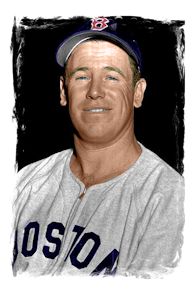 |
Tom McBride was born on November 2, 1914, in Bonham, Texas and grew up on his father’s leased farm, dreaming about playing baseball. After disastrous crop failures in 1919 and 1920, the family moved to Wolfe City, where Tommy attended school. The talented young man, a natural all-around athlete, earned 16 letters in high school. He starred in football, basketball, baseball, and track, the biggest four sports of the era. In June 1933, he graduated second in a class of 40 at Wolfe City High. He was working as a soda jerk after graduation when he got his first baseball offer. Four Wolfe City boys reported to Bonham’s Fair Grounds and played the second game of a twin bill. In 1934 Tom again played for Bonham. Midway through the season he volunteered to play shortstop and the former flychaser played so well that he caught the eye of a Chicago White Sox scout. Tom had also accepted a scholarship to play football at Austin College. Enrolling that fall, he became a standout on the gridiron and when spring arrived, he played shortstop for the baseball team. Over Christmas of 1935 hoping to realize his big league dream, he signed with the White Sox in late February and reported to Longview, Texas, of the class C East Texas League where he enjoyed a fine season. In 1937 he was optioned to Dallas of the class A Texas League. In the ninth game disaster struck. His cheekbone was shattered by an inside pitch. After healing, he was sent to Jackson, Mississippi, of the Class C Southeastern League. But another injury ended his season. Stretching a line-drive single into a double, he slid into second base and bent his left ankle back, breaking bones and tearing ligaments. In 1938 he split the season between Dallas-Shreveport of the Texas League, and Jackson. But on a late-season slide into third base, reinjured the left ankle and again was sent home in a cast. The White Sox released him, but the Jackson club kept his contract. He played the 1939 and 1940 seasons for Jackson, hitting .297 and .316, respectively. Despite being the league’s MVP in 1940, he was discouraged and thought about quitting baseball. But he went back to Jackson in 1941 and was torrid. From May thru June, he hit enough to pull his average up to .420. His incredible hitting prompted Jackson to sell him to Little Rock of the Double-A Southern Association. Again he proved himself a fine hitter, averaging .350 for Jackson and then .320 for Little Rock. The Red Sox bought his contract. Due to his ankle injuries, Tom was 4-F for the draft, but for the Red Sox he played well. In May, he was sent me to Louisville, their Triple-A farm club and went on a binge there, where he had a 22-game hitting streak, and wound up hitting .308 and back to the Red Sox in August. During the final year of World War II, Tom produced his best big league season. In 100 games and 344 at-bats, he hit .305 with 11 doubles, seven triples, and one four-bagger. That summer he came up with his 6-RBI game against the Senators. In 1945, he was put into 100 ball games, some at first base and hit .305. But the following year, with big leaguers returning from military service, competition for roster spots was intense. The Red Sox enjoyed a great season, posting a 104-50 record and running away with the American League flag. Tom was used as a pinch-hitter and a utility outfielder and averaged .301 in 61 games, making an excellent contribution to the Red Sox. The Sox brought up rookie Sam Mele to play right field in 1947 and Tom got into only two games. In May, he was sold to Washington where he finished his big league career. After the 1948 season, Tom was supposed to manage in the minors. Instead, he was sold to Chattanooga in 1949. When he was refused a deal to manage in 1950, he moved his family home to Sherman. He was told to check out a new semipro team in Sinton, the Plymouth Oilers. He had friends playing for Plymouth and the club hired him, earning as much as he once did at Chattanooga. After the Oilers disbanded in 1957, Tom worked at a variety of jobs, including as a manager of rental properties. In 1960 he moved his family from Sherman to Wichita Falls. He had officiated college football for 32 years and in 1977, was hired as a 63-year-old assistant baseball coach at Midwestern State University in Wichita Falls. Tom McBride retired in 1982, and remained a clean-living man who never drank or smoked. He passed away at age 87, on December 26, 2001, in Wichita Falls, Texas. |
|||||
